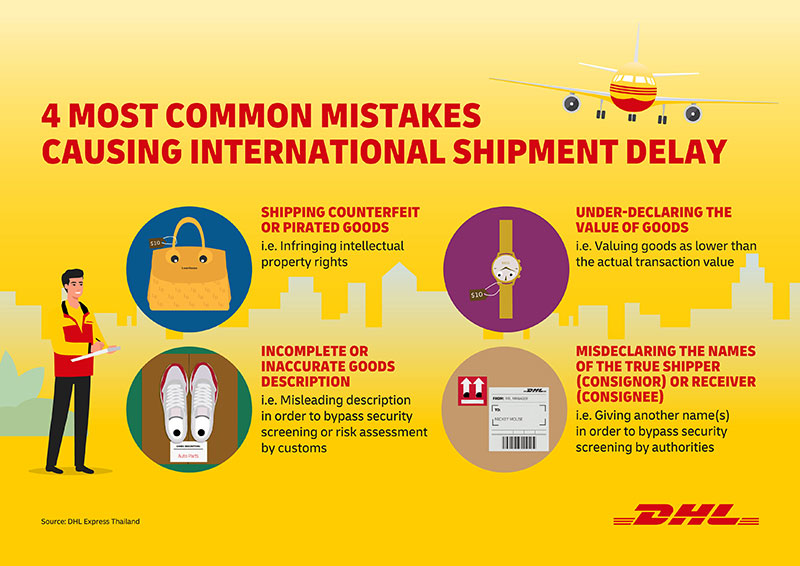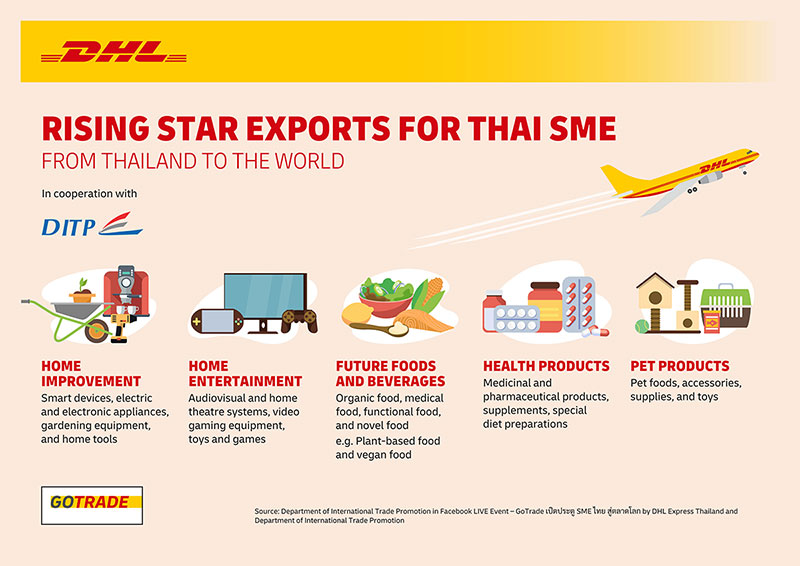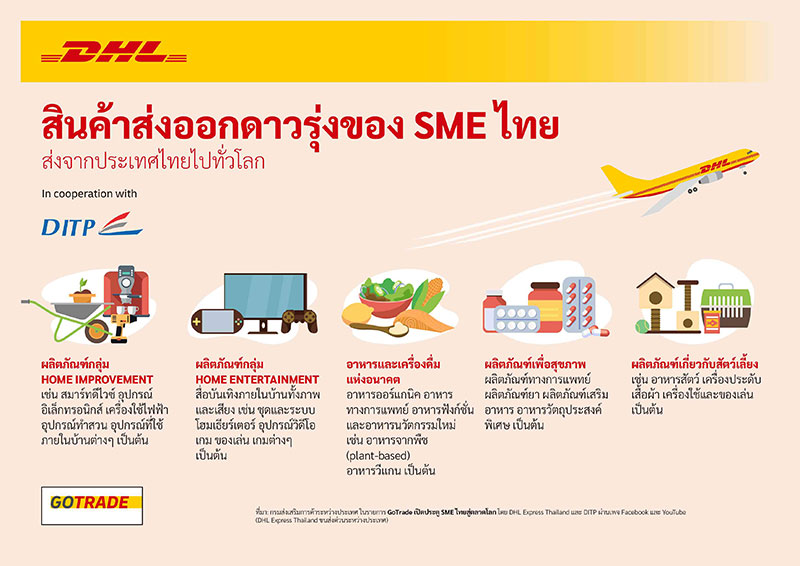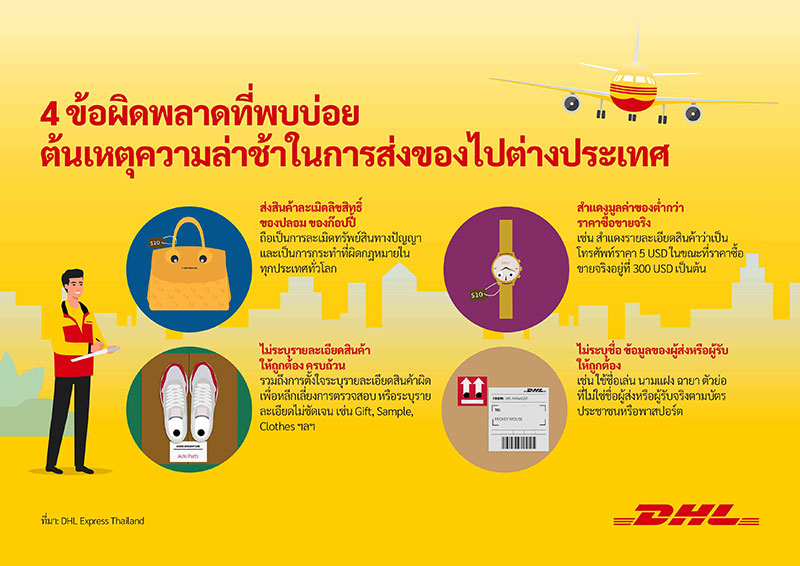DHL Express Thailand and the Department of International Trade Promotion (DITP) organized a webinar on the topic “GoTrade opens door to global market for Thai SMEs” on May 26, revealing insights to Thai SMEs on emerging export markets, rising star products, challenges and opportunities in export, export trends, changing consumer behaviors, and tips for exporters. Highlighted points are as follows:
Keep an eye on global demand and supply, opportunities for Thai exporters
As Thais prepare to live with COVID-19, their lifestyles and consumption behaviors have also shifted. According to the international trade and consumption trends compiled by DITP, today’s consumers focus on healthcare, happy living and sustainability. This provides an opportunity for businesses to leverage these trends, thereby enabling the country’s economy to grow sustainably and creating economic value. In the first quarter of this year (Jan-Mar), Thai exports totaled 2,401,444 million baht, up 14.9%.[1]
Innovations for health and future food – future of Thai exports
Today’s consumers are more attentive to their health and upgrading their lifestyle. As a result, future food products have flourished significantly. These products include organic, functional, medical and innovative foods such as plant-based items – a market that is estimated to be worth 5.7 trillion baht in 2027, with the US being the largest market, followed by the UK.
- Nearly half of US residents want to reduce their meat consumption. Leading plant-based food shipments in 2020 were said to to exceed USD 1 billion or 33 billion baht.
- During 2019 – 2021, plant-based food consumption grew by 49% in 11 European countries with total sales of 3.6 billion euros (approximately 139 billion baht). Plant-based milk products registered the highest sales, followed by plant-based meat. The largest markets are the UK and Germany. [2]
- In the health product category, the Chinese spend 10% of their income on nutritional supplements, while nine in 10 British people need food and beverage products that can help boost their immunity.
- Thailand’s insect food is another popular product desired by foreigners. In the US, the market value is USD 15.5 million (465 million baht) in 2020 and is likely to grow by more than 40% annually.
- During the past year, the economy of sleep has emerged in China, aiming to solve people’s sleeping problems. Sleep-related products and services saw significant growth among young Chinese consumers, especially innovative sleep-promoting products, which are projected to reach 5 trillion baht in 2030.[3]
Future food will be the future of Thai exports as it will generate considerable income for the country, extending from selling raw materials alone. Thailand’s future food products exported to the global market in 2021 totaled 93,602.17 million baht, up 4.86%. The major markets include the US, China, Cambodia, Myanmar and the Netherlands. The products that are tending to expand significantly are functional food, medical food and alternative proteins. In 2022, this product group is expected to grow by 5% as consumer demand in the global market has continuously increased.
Home improvement products continue to grow strongly
Consumers have been spending more on products for household activities due to quarantine during the pandemic. This is not just a trend nor it is temporary; it has become an emerging lifestyle as people tend to focus on their personal space or place. They spend more time renovating their homes and creating a hybrid work environment in their residence. And if any brands show their commitment to environmental protection, this will contribute to their sales because consumers want to take part in conserving the environment through the brands they use.
Cross-border delivery service still influences purchase decisions
Shipping quality is another factor for building trust between customers and brands, especially for goods that are shipped across borders. In addition to having international express delivery partners to advise on the customs regulations in each country, entrepreneurs should avoid four mistakes that cause export/import delays and obstacles:
- Shipping counterfeit, pirated or copied items: These items are illegal in every country including Thailand, which has announced the prohibition of the export and import of pirated goods.
- Under-declaring the value of goods: Valuing goods as lower than the actual transactional value will cause a delay in transportation. If this is an import of goods that are subject to duty and tax, it will also be considered a customs offense for tax evasion.
- Incomplete or inaccurate goods description: Filling in information that does not match the actual product, for example, inputting the product details as ‘Gift’ instead of specifying the accurate description prolongs the investigation process and causes international shipping delays.
- Misdeclaring the names of the true shippers (consignor) or receiver (consignee): Specifying the full name as per ID card or passport as well as address or company name corresponding to the document certified in that country is a legal requirement in compliance with regulations and practices for safety and customs declaration.

GoTrade: A powerful lever for sustained economic growth
Helping SMEs in developing countries access global markets is a proven way of DHL to connect people and improve lives. The GoTrade initiative draws on the Group’s expertise in trade facilitation to help SMEs gain access to the global market. Common challenges SMEs face include inefficient import/export processes, lengthy paperwork or simply businesses wanting access global markets. GoTrade is a powerful lever, as it supports DHL customers from the SME sector to understand how to bypass real bottlenecks, and get their goods through customs much faster and more efficiently. DHL works together with government agencies to make these necessary changes and help cultivate an environment, where SMEs can thrive and cross-border trade can grow.
Mr. Chanthapat Panjamanond, Director of Office of Digital Commerce Market, DITP says, “Overall, Thai exports in 2022 are still expanding well with 12 months of continuous growth until March[4]. Some Thai export products grew their market share in primary markets such as China, the USA and Asean countries while emerging markets like Africa, the Middle East and South America are potential markets for Thai SMEs to aim to. Factors that support Thai exports include the expansion of the manufacturing sector, bulk import of products influenced by the Russia-Ukraine conflicts, as well as promotion efforts by the Ministry of Commerce. Having a company with a global network and trade expertise like DHL Express is very valuable to us, helping us ensure our projects remain pragmatic and results-orientated. SMEs will be able to tap into the growth potential of cross-border trade without any logistics bottlenecks and get their goods flowing faster and more effectively.”
Herbert Vongpusanachai, Managing Director for Thailand and Head of Indochina, DHL Express, says, “Many countries focus on cross-border e-commerce to accelerate economic recovery. In world trade, infrastructure and logistics play a crucial role in reducing international trade bottlenecks. Cross-border trade creates prosperity and improves lives but there are still major barriers in many regions, and that’s why we started GoTrade. Our collaboration with DITP aims to enable SMEs to sell their goods internationally via e-commerce through our strong network to achieve sustainable and inclusive economic growth. GoTrade is also designed to help businesses navigate customs processing, increase export and import volumes and reduce barriers to cross-border trade.”
Parichart Pramukkul, Vice President, Commercial, DHL Express Thailand, says, “Currently, there are opportunities for Thai SMEs to go global under favorable circumstances for exports, such as vaccination against COVID-19 in many countries, easing trade restrictions, increasing investment in logistics business to expand cargo capacity, and more trade facilitation. However, administrative, technical, and regulatory barriers can hamper SMEs from expanding overseas. GoTrade underlines our efforts to mitigate these bottlenecks by leveraging our industry expertise and providing them with practical knowledge and resources to help them overcome these challenges.”
Read the article at https://dhltoyou.com/en/blog/detail/124/DITP-DHL-Express-GoTrade-webinar



